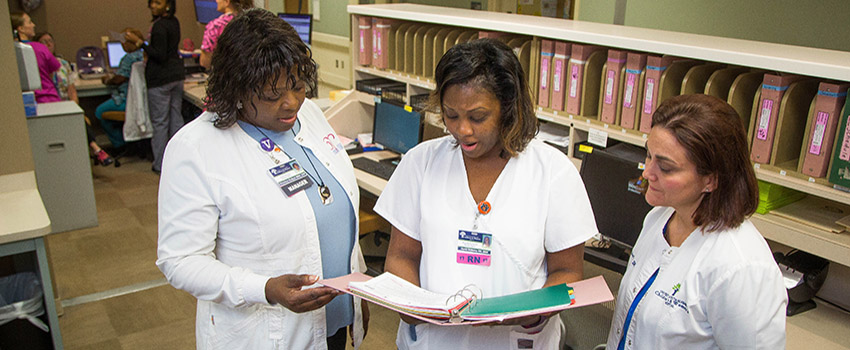Bachelor of Science in Nursing (BSN)

The University of South Alabama Bachelor of Science in Nursing (BSN) program provides the skills necessary for a rewarding career. Graduates are prepared to complete the National Council Licensure Examination (NCLEX-RN® exam) and may be eligible to apply for licensure to practice as a Registered Nurse and to continue with graduate study. The pre-licensure BSN program meets the requirements in all states to apply for licensure as a registered nurse upon successful completion of the NCLEX-RN exam.
University of South Alabama nursing graduates have outstanding outcomes. Employment rates are also outstanding. More than 90 percent of graduates find professional employment immediately. Within six months of graduation, virtually all who desire nursing jobs have found them.
While at South, students work with distinguished faculty members who share expertise in nursing across the lifespan. Skill and simulation labs help students refine their techniques; team-based learning allows them to collaborate with other students and faculty, and resources and support help students achieve excellent outcomes. A variety of clinical placement options allow students to gain practical experience and first-hand knowledge into the many aspects of healthcare.
The bachelor of science in nursing program maximizes the value of each student’s educational background. Traditionally, the first two years are spent in meeting general university requirements with courses in science, math, arts and humanities, while the last two years are focused on the professional preparation in nursing. The CON offers an accelerated program for students who have earned a bachelor’s degree in another field. In addition, an RN-BSN pathway is available to RNs who have completed an Associate Degree in Nursing or a diploma.
South offers several paths toward a BSN:
- A traditional four-year program for students with a high school diploma.
- An accelerated program for students with a bachelor’s degree in another field.
- RN to BSN Program for students with an Associate Degree in Nursing.
- An early admission program for students with a 3.5 high school GPA and 25 ACT score.
- An early admission program for freshman students entering their sophomore year at South.
- If you’re not sure which option is best for you, our advisors can help you find the best fit.
Upon completion of the Bachelor of Science in Nursing program, graduates should be able to:
- Apply current and evolving knowledge from nursing science and related disciplines as the basis for clinical judgement and innovative nursing practice
- Demonstrate holistic, person-centered, and culturally inclusive nursing care of individuals, families, and communities
- Identify the impact of social determinants of health on individuals, families, and communities within the healthcare delivery continuum using principles of collaboration and advocacy to improve health outcomes across populations
- Understand the research process and use nursing knowledge and evidence-based practices to improve healthcare and patient outcomes across populations
- Identify and communicate safety and quality concerns and implement best practices that ensure a culture of safety in a high-quality care environment
- Collaborate and communicate with individuals, families, communities, and interprofessional teams to deliver person-centered care and achieve shared goals and improved health outcomes
- Understand how healthcare systems deliver cost-effective, evidence-based, and innovative care across the continuum, optimizing outcomes and system effectiveness
- Utilize informatics and healthcare technologies to promote the delivery of high-quality nursing care and to facilitate clinical decision-making, communication, and documentation
- Develop a professional identity in nursing that includes ethical practice, accountability, and adherence to laws and regulations, through a participatory approach to care in service to individuals, community, and the profession
- Establish a commitment to personal well-being, professional growth, and emerging leadership through a spirit of inquiry, accountability, self-reflection, and dedication to lifelong learning
